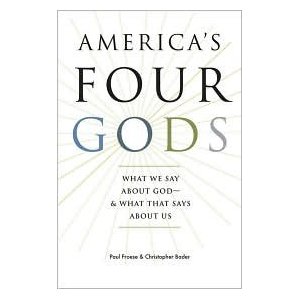Paul Froese and Christopher Bader. America’s Four Gods: What We Say About God – & What That Says About Us. Oxford University Press, 2010. ISBN: 9780195341478.
Meet the Authors
Paul Froese and Christopher Bader both serve as assistant professors of sociology at Baylor University. America’s Four Gods: What We Say About God – & What That Says About Us (2010) is the first book they have written together.
Froese (pictured at left) specializes in comparative historical research with an emphasis in religion. He is the author of The Plot to Kill God: Findings from the Soviet Experiment in Secularization (2008). Froese also serves as a research fellow at Baylor’s Institute for Studies of Religion.
Bader’s (pictured at right) research foci are the sociology of religion and criminology. He is the co-author of Paranormal America: Ghost Encounters, UFO Sightings, Bigfoot Hunts, and Other Curiosities in Religion and Culture (2011). Bader was a principal investigator of the first two waves of the Baylor Religion Survey and currently serves as associate director at the Association of Religion Data Archives.
Book Basics
 With more than 9 in every 10 people expressing a belief in God, America is among the most religious nations. America’s Four Gods develops a new understanding of the God that transcends religious tradition. Basing their assertions on two national phone surveys (2006 and 2008) and more than 200 in-depth interviews, the authors divide Americans into four groups:
With more than 9 in every 10 people expressing a belief in God, America is among the most religious nations. America’s Four Gods develops a new understanding of the God that transcends religious tradition. Basing their assertions on two national phone surveys (2006 and 2008) and more than 200 in-depth interviews, the authors divide Americans into four groups:
- Americans who believe in a God who is both engaged in the world and judgmental — The Authoritative God
- Americans who believe in a God who is engaged, yet not judgmental — The Benevolent God
- Americans who believe in a God who is judgmental, but not engaged — The Critical God
- Americans who believe in a nonjudgmental and disengaged God — The Distant God (p.24)
If you want to better understand why you believe in the kind of God you do or gain a deeper appreciation of the variety of images found within your religious tradition, there is no better place to begin than America’s Four Gods.
So What?
Our religious beliefs are more common than we may have ever imagined. Froese and Bader go so far as to suggest, “By knowing where you live, what you look like, and how much money you make, we can begin to guess your image of God” (p.57).
- Which of the four God types best describes you? most people in your congregation? denomination?
- Within the context of our nation’s high religiosity and religious pluralism, how might these God types be helpful constructs for engaging in interreligious dialogue?
- Recognizing that your background contributes heavily to your view of God, how do you feel when you encounter a statement such as the one quoted above that suggests just by knowing some data about you another person can reasonably assume your view of God?

